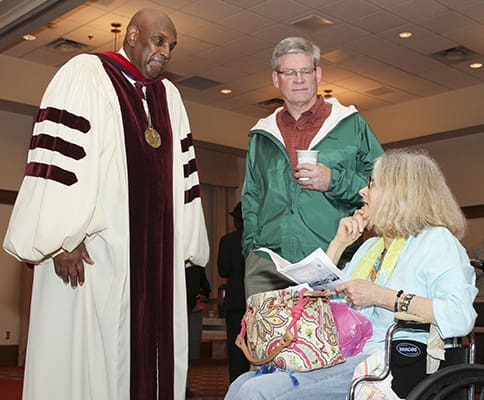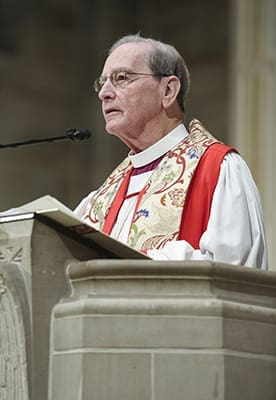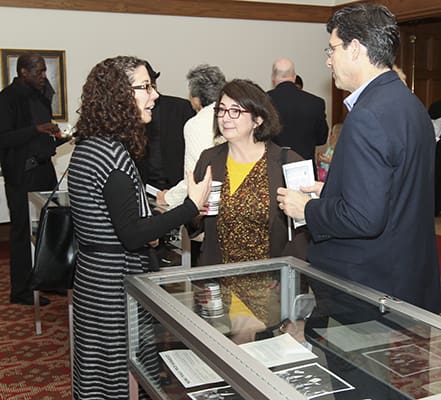(L-r) Bishop Bernard E. Shlesinger III; Rev. Dr. Gerald Durley, pastor emeritus of Providence Missionary Baptist Church, Atlanta; Father Panayiotis Papageorgiou, Ph.D., presiding presbyter of Holy Transfiguration Greek Orthodox Church, Marietta; Evangelical Lutheran Church in America Bishop H. Julian Gordy; and retired Assisting Episcopal Bishop Don Wimberly join the congregation in singing “I Want Jesus To Walk With Me.” The April 23 Ecumenical Prayer Service took place at the Cathedral of Christ the King, Atlanta. Photo By Michael Alexander
Atlanta
Sacred gathering of Christian leaders marks King anniversary
By ANDREW NELSON, Staff Writer | Published May 3, 2018 | En Español
ATLANTA – Gospel songs echoed off the stone walls of the Cathedral of Christ the King as spiritual leaders from different Christian denominations focused on the legacy left by Rev. Dr. Martin Luther King Jr.
The gathering on April 23 brought some 200 people together with five leaders from Protestant, Orthodox and Catholic churches to the mother church of the Atlanta Archdiocese. Attendees recalled Rev. King’s words to be renewed in the vision and mission of the slain Baptist minister. The prayer service marked the 50th anniversary of the assassination of King.

During the reception that followed the Ecumenical Prayer Service, Rev. Dr. Gerald Durley, left, pastor emeritus of Providence Missionary Baptist Church, Atlanta, fellowships with Becky McDonough, right, and Jim King, members of the Cathedral of Christ the King, Atlanta. Photo By Michael Alexander
Rev. Dr. Gerald Durley, pastor emeritus of the Providence Missionary Baptist Church of Atlanta, joined the movement for civil rights in 1960. Rev. Durley, speaking from the stone pulpit, said Rev. King’s quest continues in the effort to uphold human dignity and importantly, with those in disagreement.
“He understood if we are to rise above all the challenges and controversies, we cannot fight fear and hate with fear and hate. Dr. King said nonviolence means respecting the rights of all human beings,” said Rev. Durley. “This means someone I disagree with is still entitled to my respect, to kindness and appreciation of their dignity as human beings. That’s what human dignity is about.”
The gathering of different spiritual leaders and the congregation made it a “very sacred place,” he said.
The shooting of King was an “untimely but ordained moment,” he said.
“Tonight we heard about faith, hope, love, but human dignity is so important in the life he taught each one of us,” said Rev. Durley. “The quote that has sustained me is this, ‘the ultimate measure of a man is not where he stands in moments of comfort, but where he stands at time of challenge and controversy.’”
The other leaders sitting close to the altar were Bishop H. Julian Gordy, of the Evangelical Lutheran Church in America; Father Panayiotis Papageorgiou, the presiding presbyter of the Holy Transfiguration Greek Orthodox Church of Marietta; and retired Assisting Episcopal Bishop Don Wimberly, Episcopal Diocese of Atlanta. Archbishop Wilton D. Gregory sat in the cathedra, a chair reserved for the bishop in his church. Auxiliary Bishops Bernard E. Shlesinger III and Joel M. Konzen, SM, also attended.
Rev. King’s legacy of faith and love
The ministers spoke about themes of Rev. King’s ministry, from faith and hope to human dignity and discipleship.
Father Papageorgiou recalled that he was a young man in his native Cyprus in April 1968. He said he couldn’t understand the news on the radio where “terrible news kept coming from a great nation as America.”
One of the gifts left by King’s legacy is his understanding of hope, he said. “Hope is related to the benefit of we, of all of us, the many,” said Father Papageorgiou.

During the Ecumenical Prayer Service, commemorating the 50th anniversary of the assassination of Dr. Martin Luther King Jr., retired Assisting Bishop Don Wimberly, Episcopal Diocese of Atlanta, speaks on the theme of love. Bishop Wimberly said the late Dr. King was a servant of justice and peace, but most of all he was a servant of God. Photo By Michael Alexander
Reciting excerpts of King’s writings, he read, “If there is only one thing that the church must do is keep the flame of hope burning.”
Bishop Gordy called King a “crazy member of the Christian community who really took Jesus seriously.”
About King’s faith, Bishop Gordy said, “He trusted God was the God of justice, and God’s good will would ultimately triumph over all human evil and injustice and cruelty, and so he was courageous, and strong, and tireless in carrying out his part in God’s agenda.”
Bishop Wimberly spoke about love, reading from St. Luke.
“Dr. King was a servant. Dr. King was a servant of justice, he was a servant of peace, he was a servant of nonviolence, he was a servant of his fellow man because Martin Luther King Jr. was a servant of his God.”
Choirs performing at the service were the AMA Choir of Our Lady of Mercy High School, directed by Franck Launay-Fallasse, with Mark Beno on piano; the choir of St. Anthony of Padua Church, Atlanta, under the direction of John Beal III, director of music; and the Cathedral Choir of Christ the King, led by Kevin Culver, the choirmaster. The cathedral organist is Timothy Wissler.
“A beatitude people”
Archbishop Gregory reflected on an event in Atlanta’s backyard, speaking about the community’s response to the neo-Nazi and white supremacist rally in Newnan on April 21.
“The hate groups came to disrupt and make a statement,” he said. “Fortunately, they were only the first part of the statement. The most important part of the statement was made by the wonderful people of Newnan, who decided to come out in great numbers to say what was being proposed by the protestors was not the way that they wanted to live. They made a bold statement—that’s not who we are. Nor is it who we want to be.”
He believed Dr. King would look with pride at Atlanta and its values.
“How proud he would be of Atlanta, not because we have solved all of our problems, because we haven’t, but he would be proud of his hometown when we stand up for immigrant people, when we decide that people of different sexual orientations, different races, different languages, different cultures, different religions live together in peace,” said the archbishop.
Rev. King’s shortened life left a legacy that lives today, he said.

Standing by the exhibit cases during the reception that followed the Ecumenical Prayer Service, Sarah Mundell, left, a member of the Catholic Focolare Movement, talks with Irma and Terry Bliss, members of Holy Transfiguration Greek Orthodox Church in Marietta. Photo By Michael Alexander
“This evening, we are a beatitude people, blessed, not because we don’t have sorrows, or fears, not because we have everything put together and in order, but because we believe God’s promise will rectify all that is incomplete in us,” said Archbishop Gregory. “Thank you Dr. King for your life, for your witness, for your courage and for helping us to believe that God will fulfill his promise.”
Attendee Tomi Johnson called herself an “old human rights activist.” She worships at Holy Transfiguration Greek Orthodox Church of Marietta. Johnson said during the signing of the anthem “We Shall Overcome” she changes the lyrics to reflect her desire to see immediate change when she sings “today” instead of “some day.” “That’s what I think we need to do,” she said.
She left the service renewed in her defense of human dignity. She said she is concerned about violence between the police and African-Americans, along with mass imprisonment of African-Americans.
She said, “Fifty years after King died, we are still talking about it.”
German native Klaus Prand left the cathedral impressed to see the different Christian faiths together. He said that would not be seen in his country.
“This is absolutely rare,” said Prand. “This is the proof we are one.”
An Atlanta seminarian, Avery Daniel assisted the speakers during the evening prayer service.
He said King’s message “has undeniably shaped the practice of my faith as an African-American Catholic.” King serves as a role model to follow “peaceful yet firm insistence on the universal dignity of mankind and peaceful yet firm resistance to racism,” he said.
Daniel said one of the night’s highlights was conversation he had with Rev. Durley.
The minister asked Daniel, “Are you studying to be a priest?”
Daniel said, “Yes Reverend, I am.”
“Where are you from?” asked Durley.
Daniel replied, “From Stone Mountain, Reverend.”
“Say what! You’re from Georgia? In Scripture it says ‘can anything good come from Galilee?’ I said, ‘Can anything good come from the seat of the Ku Klux Klan, Stone Mountain?’ But clearly something has. You know, it makes me so happy to see that you are going to be a Catholic priest,” said Rev. Durley.
Daniel told him he has been studying in Rome and is the only African-American seminarian at the North American College.
Durley said, “This is why we marched and went to jail, for people like you.”